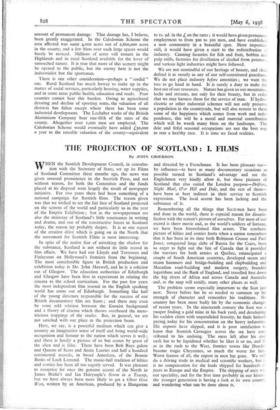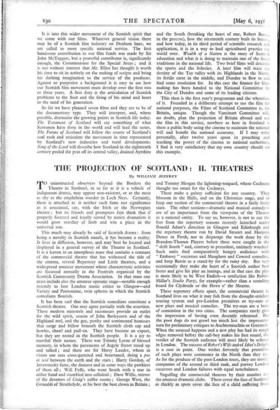THE PROJECTION OF SCOTLAND : I. FILMS
By JOHN GR IERS ON
WHEN the Scottish Development Council, in consulta- tion with the Secretary of State, set up its Films of Scotland Committee three months ago, the news was given unusual prominence in the Scottish Press, and not without reason, for both the Committee and the funds placed at its disposal were largely the result of newspaper initiative. For two years there had been something of a national campaign for Scottish films. The reason given was that we wished to see the fair face of Scotland projected on the screens of the world and particularly so in the year of the Empire Exhibition ; but as the newspapermen are also the mainstay of Scotland's little renaissance in writing and drama, and one of the 'constructive forces in Scotland today, the reason lay probably deeper. It is as one aspect of the creative drive which is going on in the North that the movement for Scottish Films is most interesting.
In spite of the native fear of mistaking the shadow for the substance, Scotland is not without its little record in film affairs. We have had our Lloyds and Torrences and Finlaysons on Hollywood's frontiers from the beginning. The most considerable figure in British production and exhibition today is Mr. John Maxwell, and he is a solicitor out of Glasgow. The education authorities of Edinburgh and Glasgow have been first in experiment in relating the cinema to the school curriculum. For the past few years the most independent film journal in the English speaking world has come out of Edinburgh. Something like half of the young directors responsible for the success of our British documentary film are Scots ; and there may even be some odd relation between the Knoxist background and a theory of cinema which throws overboard the mere- tricious trappings of the studio. But, in general, we are not satisfied with our place in the projection beam.
Here, we say, is a powerful medium which can give a country an imaginative sense of itself and bring world-wide recognition and honour to the nation which serves it well ; and there is hardly a picture of us but comes by grace of the alien and is false. There have been Rob Roys galore and Queens of Scots and Annie Lauries and half a hundred sentimental records, in broad American, of the Bonnie Banks of Loch Lomond. The music-hall tradition of kitties and comics has been all too eagerly served. It was pleasant to recognise for once the genuine accent of the North in James Bridie's and Ian 'Dalrymple's Storm in a Teacup, but we have always been more likely to get a Ghost Goes West, written by an American, produced by a Hungarian and directed by a Frenchman. It has been pleasant too— by influence—to have as many documentary occasions as possible turned to Scotland's advantage and see the Englishmen very kindly allow it, but these pictures of Scotland that also suited the London purpose—Drifters, Night Mail, O'er Hill and Dale, and the rest of them— have been at best indirect in their service to Scottish expression. The local accent has been lacking and the substance of it.
Remembering all the things that Scctsmen have been and done in the world, there is especial reason for dissatis- faction with the screen's picture of ourselves. For most of our record is sheer movie and, as the world's soldiers of fortune, we have been foreordained film actors. The synthetic picture of kitties and comics hurts when a nation remembers that it has been in its time both Robinson Crusoe and Paul Jones, conquered large slabs of Russia for the Czars, been so eager to fight out the fate of Canada that it provided the warriors for both armies at Quebec, emancipated a couple of South American countries, developed steam and steam hammers and bridge-building and shipbuilding and Macadam road-building and modern surgery, founded logarithms and the Bank of England, and travelled first down the big rivers of Africa and across Canada and Australia and, as the map will testify, many other places as well.
The problem seems especially important to the Scot just now. Never before has he so needed to summon up his strength of character and remember his traditions. No country has been more badly hit by the economic changes of recent years. In the nineteenth century the .Scot was a pauper finding a gold mine in his back yard, and developing his sudden claim with unparalleled ferocity, he finds himsch paying,today for his concentration on the heavy industries. His exports have slipped, and it is poor satisfaction to know that Scottish Carnegies across the sea have con- tributed to his undoing. The mess left after his coal rush has to be liquidated whether he likes it or no, and if, as in the rush to the West, frontier towns like Dundec become tragic Cheyennes, so much the worse for him. Worst feature of all, the export in men has gone. We stii■ do a driving trade in medical and scientific workers, but i. is no compensation for the loads shipped for hundreds o years to Europe and the Empire. The shipping of men wa - our speciality, and for the first time probably in our histor:, the younger generation is having a look at its own countr: and wondering what can be done about it, ' ' It is into this wider movement of the Scottish spirit that we come with our films. Whatever general vision. there may be of a Scottish film industry on Denham lines, we are called to more specific national service. The first handsome contribution to nur film funds was made by Sir John McTaggart, but a powerful contributor is, significantly enough, the Commissioner for the Special Areas; and it is not without interest that Mr. Elliot has thought it worth his time to sit in actively on the making of scripts and bring his dashing imagination to the service of the producer. Against so purposive a background it is easy to see how our Scottish film movement must develop over the first two .or three years. A first duty is the articulation of Scottish problems to the Scot and the firing of his mind and heart to the need of his generation.
So far we have planned seven films and they are to be of the documentary type. They will interpret, and, where possible, dramatise the growing points in Scottish life today. The Testament of Scotland will say something of what Scotsmen have done in the world and will lead the series. The Future of Scotland will follow the course of Scotland's coal rush and articulate the movement in time represented by Scotland's new industries and rural developments. Song of the Land will describe how Scotland in the eighteenth century peeled the peat off its central valley, drained Ayrshire and the South (breaking the heart of one, Robert Burns, in the process), how the nineteenth century built its breeds, and how today, in its third period of scientific research and application, it is in a way to lead agricultural practice the world- over. Wealth of a Nation is the story of Scottiqi education and what it is doing to maintain one of the finest traditions in the national life. TwO brief filnis will describe the sports and the fisheries. A later film will trace the destiny of the Tay valley with its Highlands in the North, its fertile carse in the middle, and Dundee to flow to and find some resolution for. In this case the finance for film- making has been handed to the National Committee by the City of Dundee and some of its leading citizens.
This then is the first year's programme and the wherefore of it. Founded in a deliberate attempt to use the film for national purposes, the Films of Scotland Committee is, for Britain, unique. - Though the Vansittart Committee will, no doubt, plan the projection of Britain abroad and use the film in this service, nowhere as here in Scotland is there a public body using the cinema to maintain the national will and benefit the national economy. If I may write personally, after twelve years spent in preaching and teaching the power of the cinema to national authorities, I find it very satisfactory that my own country should set this example.



































































 Previous page
Previous page